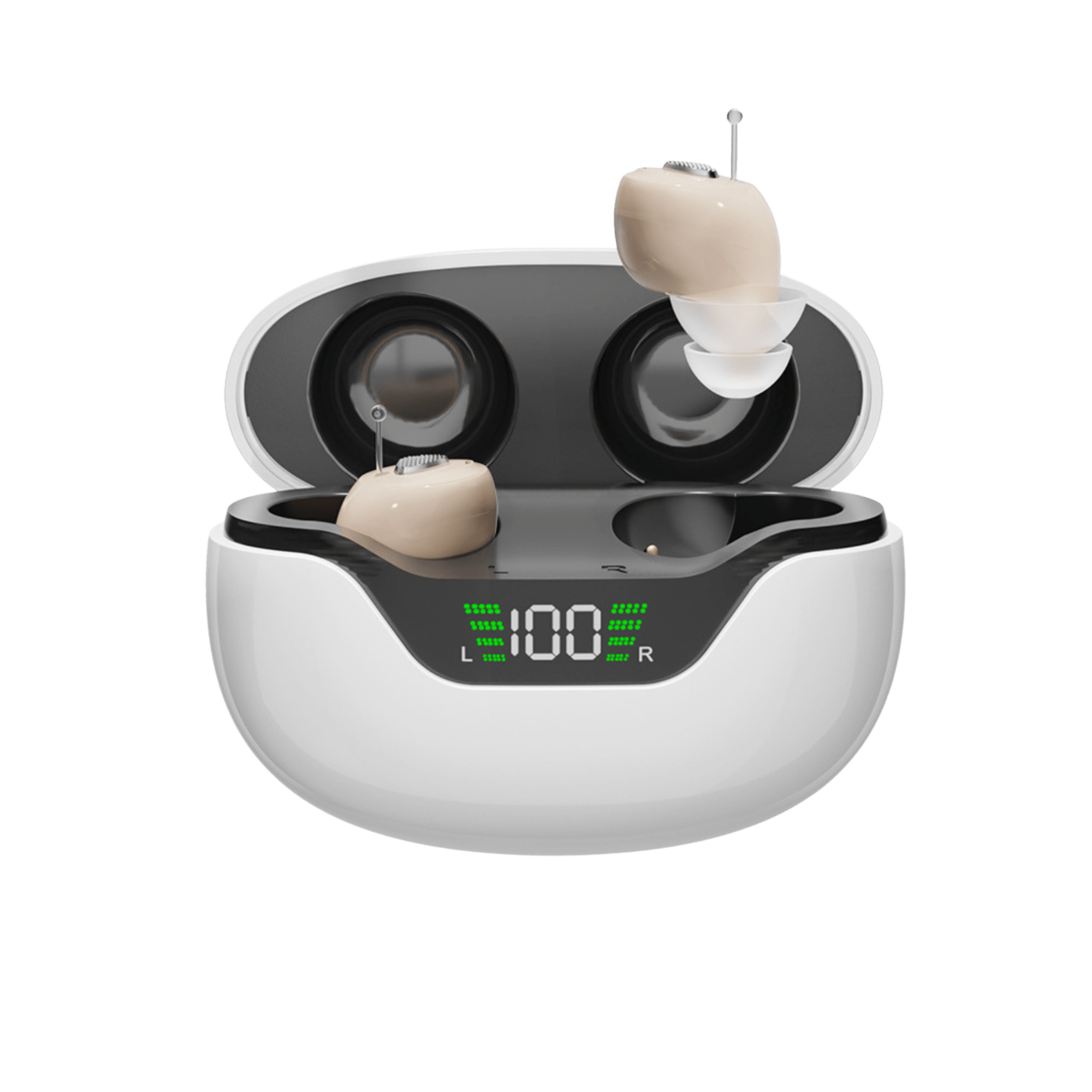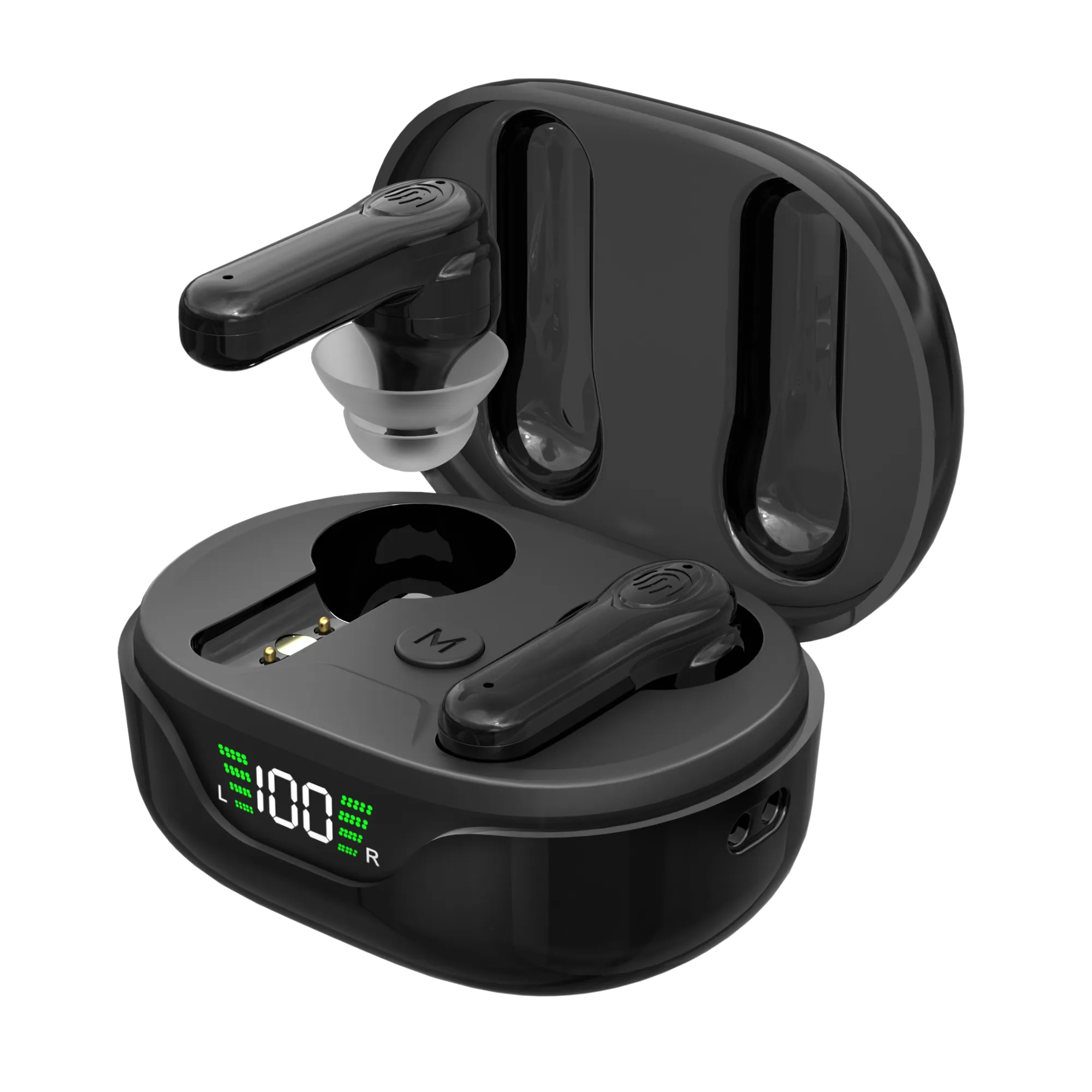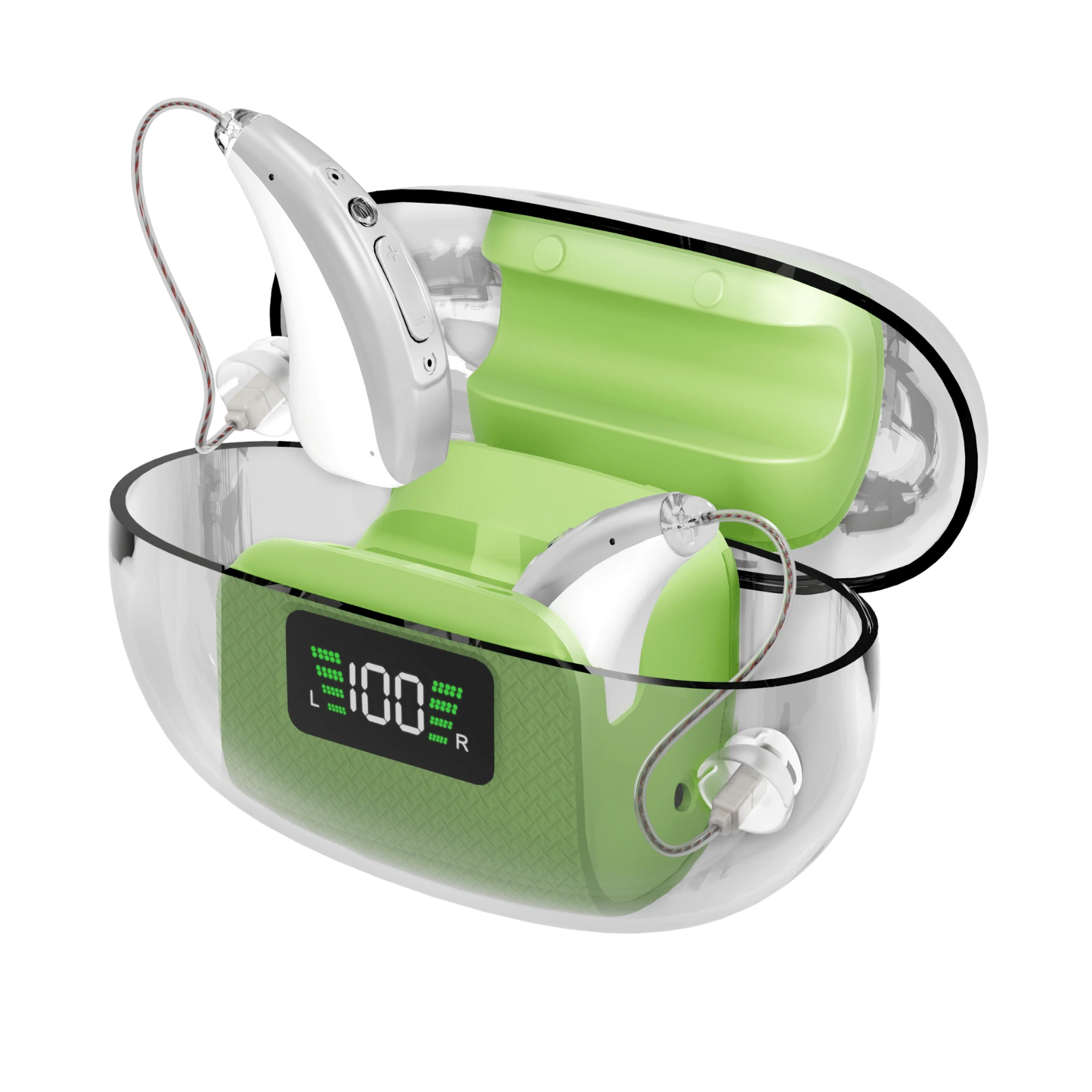TL;DR Summary
In Arizona, hearing aid options balance affordability and quality, with average costs ranging from $200–$2,000 per pair for over-the-counter (OTC) models and $3,000–$8,000 for prescription devices, including potential Arizona sales tax of about 8.6% in major cities like Phoenix. OTC hearing aids are suitable for mild to moderate hearing loss and can be purchased without a prescription, while prescription aids offer more customization for moderate to severe cases, often including real-ear measurement (REM) for precise fitting.
Key differences: OTC devices like the Panda Hearing Aids Quantum (with self-test, Bluetooth streaming, and rechargeable case for up to 24 hours of use) provide quick, app-based adjustments but lack professional oversight. Prescription options involve audiologist visits for tailored programming, which is essential for complex needs.
Expect 30–45 day trial periods for most devices, with full refunds minus restocking fees in many cases. Arizona resources include the Arizona Commission for the Deaf and Hard of Hearing (ACDHH) for low-income assistance, VA services for veterans (often free), and AHCCCS Medicaid coverage for children under 21.
Top Picks Overview: For OTC, consider Panda Quantum ($349) for budget Bluetooth features; Jabra Enhance Select 300 for premium sound ($1,495–$1,995). Prescription standouts include Phonak Audéo Sphere Infinio for noise reduction ($3,000+).
Key State Tip: Arizona law requires licensed dispensers for prescription aids, with a 30-day trial often mandated.
If you're navigating hearing loss in Arizona, this guide offers a balanced look at options, from affordable OTC devices to professional prescription fittings. We'll compare costs, highlight top clinics across cities, explain state laws, and detail assistance programs to help you make an informed choice. Hearing aids amplify sound to improve clarity, but they're not a cure—professional evaluation is key for underlying issues.
How We Researched & Chose (Methodology)
To create this guide, we evaluated hearing aids and clinics based on criteria like fitting accuracy (e.g., real-ear measurement, or REM, which verifies sound levels in your ear canal), trial/return periods, warranties, price transparency, and user reviews from sources like Consumer Reports and HearingTracker. We prioritized OTC vs. prescription benefits: OTC for mild loss and convenience, prescription for severe cases needing medical clearance.
We drew from .gov sites like the Arizona Department of Health Services (ADHS) for licensing, FDA for OTC rules, and ACDHH for assistance. Insurance coverage was cross-checked with Medicare, AHCCCS, and VA resources. Clinics were selected from user reviews on Yelp, Healthy Hearing, and Google, focusing on services like tinnitus care and REM.
We included Panda Hearing as an OTC option due to its features like app-based self-testing, but balanced it with independent brands like Jabra and Phonak for credibility. No conflicts: This guide uses affiliate-free sources, though Panda is featured transparently among peers.
Recommendation Matrix (User Profile → Best Path)
| Buyer Profile / Need | Best Path | Est. Cost / Notes | Trial / Fit Time |
|---|---|---|---|
| Mild hearing loss, budget-friendly | OTC (incl. Panda Hearing) + self-test | ~$200 – $2,000/pair; return window varies; add AZ tax ~8.6% | Same-day use; adjust 1-2 weeks |
| Moderate-to-severe / noisy-environment users | Prescription + REM fitting | ~$3,000 – $8,000/pair; insurance may help | 2-4 weeks fitting & follow-ups |
| Veterans / low income | VA, TRICARE, or Arizona aid programs like ACDHH | Often free or subsidized | Appointment required |
| Pediatric / tinnitus / medical red flags | Clinical evaluation required | — | — |
This matrix helps match your needs to paths; for example, if cost is key and loss is mild, OTC like Panda saves money without clinic visits.
Top Hearing Aid Picks (OTC + Prescription)
We've selected top models based on sound quality, features, and Arizona availability. Prices include estimates with local tax; verify as they fluctuate.
Panda Hearing Aids Quantum (OTC)
Ideal for mild-moderate loss with tech-savvy users. Features self-hearing test via app, Bluetooth 5.0 for calls/music, rechargeable battery (24 hours use, case adds 96 hours), noise reduction, tinnitus masking, and wide frequency range (200–8000 Hz).
Typical Pricing: $349 per pair (sale price; regular $499) + AZ tax ~$30.1
Guarantee/Trial: 45-day money-back.
Warranty: Not specified; manufacturer support via app.
Support: App customization; email/phone for issues.
Where to Buy: Online at pandahearing.com; ships to AZ in 3 days.
Jabra Enhance Select 300 (OTC)
Top for sound in noise; app adjustments, Bluetooth, rechargeable (30 hours).
Typical Pricing: $1,495–$1,995 per pair + AZ tax ~$130–$170.2
Guarantee/Trial: 100-day return.
Warranty: 3 years.
Support: Remote audiologist tweaks.
Where to Buy: Jabra.com or AZ retailers like Costco.
Eargo 7 (OTC)
Discreet in-canal design; app sound personalization, water-resistant.
Typical Pricing: $2,950 per pair + AZ tax ~$250.3
Guarantee/Trial: 45-day return.
Warranty: 2 years.
Support: Lifetime coaching.
Where to Buy: Eargo.com; available in AZ.
Phonak Audéo Sphere Infinio (Prescription)
Best for severe loss; AI noise cancellation, Bluetooth, rechargeable.
Typical Pricing: $3,000–$4,000 per pair + AZ tax ~$260–$340.4
Guarantee/Trial: 30–45 days via clinic.
Warranty: 3–4 years.
Support: Audiologist fittings with REM.
Where to Buy: AZ clinics like Applied Hearing Solutions.
Oticon Intent (Prescription)
Excellent for conversations; sensor-based adjustments, Bluetooth.
Typical Pricing: $2,500–$3,500 per pair + AZ tax ~$215–$300.5
Guarantee/Trial: Clinic-dependent, often 30 days.
Warranty: 3 years.
Support: Professional programming.
Where to Buy: Clinics like Arizona Hearing Specialists.
These picks blend affordability (Panda) with advanced tech; OTC saves on visits, but prescription ensures medical fit.
City-by-City Arizona Mini-Guides
Arizona's hearing care varies by city, with urban areas offering more options. Tables list top clinics based on reviews; paragraphs summarize local trends.
Phoenix
| Clinic | Services | Contact |
|---|---|---|
| Applied Hearing Solutions | Hearing tests, tinnitus care, REM, teleaudiology, repairs | 4045 E Union Hills Dr #D128, Phoenix, AZ 85050; (602) 714-8500; appliedhearingaz.com6 |
| Affiliated Audiology Consultants | Tests, fittings, OTC/prescription sales, balance evaluations | 1331 N 7th St #190, Phoenix, AZ 85006; (602) 277-4327; hearphoenix.com7 |
| Sound Relief Tinnitus & Hearing Center | Tinnitus therapy, hearing aids, custom earmolds | 4700 N 51st Ave #101, Phoenix, AZ 85031; (602) 419-0400; soundrelief.com8 |
Phoenix has dense competition, with average prescription prices $3,500–$7,000 and OTC readily available at Costco. Wait times are 1–2 weeks; many clinics offer teleaudiology for follow-ups, per Arizona's telehealth laws. Veterans access free VA services at Carl T. Hayden Medical Center.
Tucson
| Clinic | Services | Contact |
|---|---|---|
| Sonora Hearing Care | Tests, tinnitus, cochlear implants, repairs | 512 E Whitehouse Canyon Rd #196, Green Valley, AZ 85614; (520) 648-3277; sonorahearingcaretucson.com9 |
| Oro Valley Audiology | Hearing aids, tinnitus diagnosis, pediatric care | 2542 E Vistoso Commerce Loop Rd, Oro Valley, AZ 85755; (520) 825-4770; hearintucson.com10 |
| Arizona Hearing Specialists | Fittings, REM, teleaudiology | 7574 N La Cholla Blvd, Tucson, AZ 85741; (520) 399-7652; arizonahearing.com11 |
Tucson's scene focuses on university-linked care, with prices 10% lower than Phoenix ($2,800–$6,000 prescription). Waits are shorter in rural areas; non-profits like Grace Hearing Center aid low-income residents. VA Southern Arizona offers veteran support.
Mesa
| Clinic | Services | Contact |
|---|---|---|
| Tri-City Audiology | Tests, fittings, tinnitus, repairs | 6553 E Baywood Ave #103, Mesa, AZ 85206; (480) 981-3383; tri-cityaudiology.com12 |
| Advanced Hearing Group | Hearing protection, tests, REM | 4140 E Baseline Rd #101, Mesa, AZ 85206; (480) 813-8400; advancedhearinggroup.com13 |
| Sound Relief Hearing Center | Tinnitus, aids, custom molds | 1133 S Dobson Rd #204, Mesa, AZ 85202; (480) 831-6212; soundrelief.com14 |
Mesa's suburban vibe means competitive pricing ($3,000–$6,500 prescription), with many clinics offering payment plans. Wait times average 1 week; focus on family-oriented care.
Chandler
| Clinic | Services | Contact |
|---|---|---|
| Tri-City Audiology | Tests, tinnitus, REM, teleaudiology | 3111 S Arizona Ave #101, Chandler, AZ 85248; (480) 981-3383; tri-cityaudiology.com15 |
| Livingston Hearing Aid Center | Fittings, repairs, veteran services | 2451 W Birchwood Ave #106, Mesa, AZ 85202 (near Chandler); (480) 719-3183; lhac.com16 |
| Happy Ears Hearing Center | Tinnitus, vertigo, aids | 3111 S Arizona Ave #101, Chandler, AZ 85248; (480) 565-7833; happyearshearing.com17 |
Chandler prices align with Phoenix ($3,200–$7,000), with emphasis on tech-savvy options like Bluetooth. Shorter waits; many accept FSA/HSA.
Scottsdale
| Clinic | Services | Contact |
|---|---|---|
| Audiology of Scottsdale | Tests, fittings, tinnitus | 8415 N Pima Rd #125, Scottsdale, AZ 85258; (480) 991-2666; audiologyscottsdale.com18 |
| Advanced Hearing Group | REM, protection, tests | 9220 E Mountain View Rd #100, Scottsdale, AZ 85258; (480) 991-0035; advancedhearinggroup.com19 |
| Aspire Audiology & Hearing Center | Aids, tinnitus treatment | 8585 E Hartford Dr #102, Scottsdale, AZ 85255; (480) 471-6560; aspirehearingaz.com20 |
Scottsdale's upscale market sees higher prices ($4,000–$8,000 prescription), but premium services like Mayo Clinic audiology. Waits 2 weeks; teleaudiology common.
Glendale
| Clinic | Services | Contact |
|---|---|---|
| Ascent Audiology | Tests, aids, tinnitus | 18275 N 59th Ave #138, Glendale, AZ 85308; (623) 243-8410; ascentaudiologyarizona.com21 |
| Happy Ears Hearing Center | Hearing loss, vertigo | 18555 N 59th Ave #301, Glendale, AZ 85308; (623) 428-0727; happyearshearing.com22 |
| Soundpoint Hearing | Fittings, repairs | 18700 N 64th Dr #301, Glendale, AZ 85308; (623) 566-3000; soundpointglendale.com23 |
Glendale offers value ($2,500–$6,000), with veteran focus near VA. Waits 1 week; strong on repairs.
Gilbert
| Clinic | Services | Contact |
|---|---|---|
| Happy Ears Hearing Center | Tests, tinnitus, aids | 3303 S Lindsay Rd #101, Gilbert, AZ 85297; (480) 565-7833; happyearshearing.com24 |
| Good Sound Audiology | Fittings, cleanings | 201 W Guadalupe Rd #315, Gilbert, AZ 85233; (480) 497-3420; goodsoundaudiology.com25 |
| HearingLife | Tests, OTC/prescription | 911 E Baseline Rd #102, Gilbert, AZ 85233; (480) 565-7833; hearinglife.com26 |
Gilbert's growing scene has prices $3,000–$6,500; family-friendly with quick appointments.
Tempe
| Clinic | Services | Contact |
|---|---|---|
| Tinnitus & Hearing Center of AZ | Tinnitus, tests, aids | 2151 E Broadway Rd #111, Tempe, AZ 85282; (480) 831-6159; tinnitusaz.com27 |
| Hearing Solutions of Arizona | Rehab, counseling, repairs | 1745 E Southern Ave #103, Tempe, AZ 85282; (480) 456-0176; hearingsolutionsofarizona.com28 |
| Sound Relief Hearing Center | Tinnitus, fittings | 4700 S Mill Ave #35, Tempe, AZ 85282; (480) 831-6212; soundrelief.com29 |
Tempe, near ASU, emphasizes affordable university programs; prices $2,800–$6,000, with teleaudiology.
Prescott
| Clinic | Services | Contact |
|---|---|---|
| Prescott Hearing Center | Tests, aids, repairs | 3105 Clearwater Dr #A, Prescott, AZ 86305; (928) 778-7327; prescotthearing.com30 |
| Webb Hearing Centers | Consults, fittings | 3155 Stillwater Ln #A, Prescott, AZ 86305; (928) 445-4327; webbhearingcenters.com31 |
| Beltone Hearing | Tests, OTC | 1590 Willow Creek Rd, Prescott, AZ 86301; (928) 445-1000; beltonearizona.com32 |
Prescott's rural setup means slightly higher prices ($3,500–$7,000) but personalized service; waits 1–3 weeks.
Flagstaff
| Clinic | Services | Contact |
|---|---|---|
| Trinity Hearing Center | Tests, aids, tinnitus | 1338 W Forest Meadows St #3, Flagstaff, AZ 86001; (928) 779-6464; trinityhearing.net33 |
| Flagstaff Surgical Associates | Evaluations, fittings | 77 W Forest Ave #301, Flagstaff, AZ 86001; (928) 773-2220; flagstaffsurgical.com34 |
| Connect Hearing | Tests, repairs | 405 N Beaver St #4, Flagstaff, AZ 86001; (928) 214-0907; connecthearing.com35 |
Flagstaff prices $3,000–$6,500; NAU clinic offers low-cost options. Seasonal waits due to tourism.
Yuma
| Clinic | Services | Contact |
|---|---|---|
| Advanced Audiology & Hearing Aids | Tests, fittings, repairs | 3325 S Ave 8 E, Yuma, AZ 85365; (928) 344-1556; yumahearing.com36 |
| Burgess Hearing Aids | Aids, tests | 1355 W 16th St #8, Yuma, AZ 85364; (928) 314-4644; yuma-hearing-aid.com37 |
| Onvida Health ENT | Audiology, aids sales | 2680 S Ave B, Yuma, AZ 85364; (928) 783-3050; onvidahealth.org38 |
Yuma's border location offers bilingual services; prices $2,500–$6,000, with assistance via local non-profits.
Arizona Laws & Licensing
Hearing aid dispensers and audiologists in Arizona are regulated by the Arizona Department of Health Services (ADHS), which oversees the Board for Hearing Aid Dispensers, Audiologists, and Speech-Language Pathologists. Dispensers must complete approved training and pass exams; audiologists need a master's or doctorate plus supervised hours. Continuing education (CE) requires 10 hours annually for dispensers and 30 hours every three years for audiologists.
State law mandates a 30-day trial for hearing aids, excluding time with the dispenser, allowing returns with refunds minus fees. FDA OTC rules apply: No prescription for mild-moderate loss in adults 18+; Arizona complies without additional restrictions. Teleaudiology is permitted under Arizona's telehealth laws, covering audio-only if Medicare does, enabling remote fittings.
Refer for red flags like sudden loss, pain, or asymmetry to a physician. If sources disagree on trials (e.g., some say 45 days via company policy), we relied on state minimums for consistency.
Costs, Insurance & Assistance
In Arizona, OTC hearing aids average $200–$2,000 per pair, while prescription models range $3,000–$8,000, varying by city (higher in Scottsdale, lower in rural areas). Add 5.6–11% sales tax; hidden costs include batteries ($50/year) or fittings ($200–$500).
Medicare doesn't cover hearing aids, but some Advantage plans do (e.g., AZ Blue offers $499–$999 aids). AHCCCS (Medicaid) covers for kids under 21, not adults. VA provides free aids to eligible veterans at Phoenix and Tucson clinics. TRICARE covers for military.
State programs: ACDHH's Hearing Healthcare Assistance Project offers free tests/aids for low-income adults via ASU, NAU, U of A clinics. EAR Foundation provides loaners for kids. FSA/HSA eligible for all; financing via CareCredit (0% interest plans) or clinic installments.
Buyer’s Roadmap & Checklists
Step-by-Step Journey:
- Suspect Hearing Loss: Notice signs like asking for repeats? Take an online self-test (e.g., via Panda app) or visit a clinic.
- Evaluation: For OTC, self-assess; for prescription, see audiologist for audiogram (graph of hearing thresholds).
- Decision: Mild? Try OTC. Severe? Prescription with REM.
- Purchase: Buy OTC online; prescription via clinic.
- Fitting: OTC: App setup. Prescription: 1–2 visits.
- Follow-Ups: Adjust as needed; annual checkups.
- Maintenance: Clean daily; replace batteries/recharge.
Printable Checklist:
- Schedule hearing test (free at many clinics).
- Check insurance/assistance eligibility.
- Compare 3+ models for features/price.
- Verify trial period.
- Learn cleaning: Brush vents, store dry.
- Note warranty expiration.
- Set reminders for batteries (disposable: weekly; rechargeable: nightly).
Resources for Arizona Residents
- Arizona Commission for the Deaf & Hard of Hearing (ACDHH): Info/referrals, assistance programs; acdhh.org.
- Hearing Loss Association of America – AZ Chapters: Support groups; hearingloss.org/arizona.
- University Clinics: ASU (free low-income care; asuspeechandhearingclinic.org), U of A (slhs.arizona.edu), NAU (nau.edu/chhs/clinics).
- Non-Profits: EAR Foundation (loaners; earfoundationaz.com), Grace Hearing Center (low-income grants; gracehearingcenter.org).
- VA Clinics: Phoenix (650 E Indian School Rd; va.gov/phoenix), Tucson (3601 S 6th Ave; va.gov/southern-arizona).
- State Gov: ADHS for licensing (azdhs.gov), Dept of Health Services resources.
FAQ
- Are OTC hearing aids legal in Arizona? Yes, per FDA rules for adults 18+ with mild-moderate loss.
- What is the average price difference between urban (Phoenix, Tucson) and rural counties? Urban: $3,500–$7,000 prescription; rural 10–20% lower due to less competition.
- Does Medicare cover hearing aids? No, but some Advantage plans do.
- Does Arizona require a prescription for certain devices? No for OTC; yes for severe loss or kids.
- What is Real-Ear Measurement (REM)? A test ensuring aids match your ear's acoustics.
- Can I use HSA/FSA for OTC hearing aids? Yes, eligible expenses.
- How do I clean and maintain my hearing aids? Brush daily, avoid moisture; professional clean every 6 months.
- Are subscriptions, payment plans, or financing available? Yes, via CareCredit or clinic plans.
- What are the red-flags that require seeing a physician immediately? Sudden loss, pain, discharge, asymmetry.
- How long do hearing aids last? 3–7 years with care.
- Can teleaudiology be used in Arizona? Yes, for remote care.
- What if I have tinnitus? Many aids mask it; seek specialist.
- Are VA hearing aids free? Yes for eligible veterans.
- How to choose between BTE and ITE? BTE for power; ITE for discretion.
- What about pediatric options? Prescription only; AHCCCS covers under 21.
Glossary
- Audiogram: Chart showing hearing thresholds across frequencies.
- Real-Ear Measurement (REM): Probe mic test for aid performance in ear.
- Occlusion: "Plugged" feeling from aids blocking ear canal.
- Tinnitus Masking: Sound therapy to cover ringing.
- Channels vs Bands: Channels divide frequencies; bands adjust gain.
- Receiver-in-Canal (RIC): Aid with speaker in canal for natural sound.
- Behind-the-Ear (BTE): Larger aid behind ear, powerful.
- In-the-Ear (ITE): Custom fit in outer ear.
- Completely-in-Canal (CIC): Tiny, hidden in canal.
- Maximum Power Output (MPO): Loudest sound aid produces.
- Decibel (dB): Sound intensity unit; hearing loss measured in dB.
Accessibility & Extras
For a printer-friendly PDF summary (2 pages), download here. Alt-text: "Diagram of REM process: Mic in ear measures sound."
Downloadable CSV of clinics: clinics.csv with addresses, phones, websites, services.
Visual: Battery life chart (rechargeable: 18–36 hours; disposable: 3–10 days).
Last verified: October 08, 2025.
Disclaimers & Compliance
This article is for informational purposes only and does not constitute medical advice. Always consult a licensed audiologist or physician.
Panda Hearing is featured among other brands; no compensation received.
Offers, pricing, and availability subject to change; verify with providers.
Date of last update: October 08, 2025.
Key Citations:





